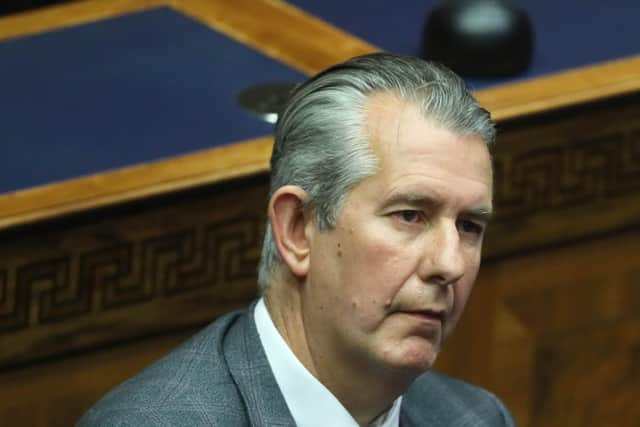It’s D-Day for Poots’ Climate Change Bill
and live on Freeview channel 276
The Bill, tabled for discussion on February 1 will see MLAs debate and vote on clauses of the proposed climate change legislation.
One of the key recommendations proposed is to reduce greenhouse gas emissions in Northern Ireland by 82 percent by 2050. This is a target the agri-food supply chain regards as highly ambitious, but attainable. Members of the supply chain agree that there is an imminent need to address global warming and reduce greenhouse gas emissions. The industry is calling on MLAs to ‘do the right thing’, back the science and expert evidence behind the targets in the Bill and afford the industry an opportunity to make real and meaningful change in the years ahead, while not compromising their role in providing high-quality, affordable food.
Advertisement
Advertisement
Imploring MLAs to back the proposals outlined in the Bill, Ian Stevenson, Chief Executive of the Livestock and Meat Commission, said: “The Executive Climate Change No. 2 Bill sets out an 82 percent reduction in Northern Ireland greenhouse gas emissions.


“This is the recommended target for Northern Ireland as set out by the UK Climate Change Committee. This is a very challenging target but one that industry can work towards as it should be technically possible to deliver such a reduction without decimating the industry.”
Conall Donnelly, Chief Executive of the Northern Ireland Meat Exporters Association supported Ian’s comments and went on to outline that the industry is aware that some MLAs will seek to table amendments to the Bill in a bid to alter proposed targets. He added:“We must remain mindful that beef, lamb and dairy contribute over 50 percent of the £5billion turnover of the agri-food industry in Northern Ireland. The sectors also help support a significant percentage of the 113,000 jobs connected to agri-food. When tabling or supporting amendments MLAs should not seek to undermine or contradict the vital contributions made by our sector.”
Mike Johnston, Chief Executive of the Dairy Council for Northern Ireland reiterated the important role of livestock farming here.
Advertisement
Advertisement
Mike commented:“Rural communities in every corner of Northern Ireland from Coleraine to Craigavon and Lisnaskea to Larne depend on ruminant livestock farming and food processing. The ruminant sectors in Northern Ireland are a key part of UK and European food supply and those MLAs who would advocate a contraction of our industry to meet unrealistic greenhouse gas emissions reduction targets in Northern Ireland beyond 82 percent by 2050 need to take a long hard look at themselves.”
Gill Gallagher, Chief Executive of the Northern Ireland Grain Trade Association said:“The agri-food sector is an integral part of the Northern Ireland economy. The proposed 82 percent reduction in greenhouse gas emissions should be accepted by MLAs. Anything in excess of this will ultimately result in significant reductions in local livestock numbers and increased imports of food with a higher carbon footprint to fulfil demand. If the Assembly legislates for unrealistic targets, it can do nothing to stop this displacement and the net outcome will be higher global emissions.
“The agri-food sector in Northern Ireland produces food to some of the highest quality standards for animal health, welfare and environmental standards and this cannot be undermined by any decision to adopt unrealistic targets for greenhouse gas emissions. The industry is up for meeting the challenge of reducing emissions, but we need our efforts to be supported.”
Coming together the industry chiefs urged MLAs to ask themselves some serious questions in advance of Tuesday’s debate:
Advertisement
Advertisement
- Do you support legislation that will diminish our farming base, leaving a supply gap that will be filled by distant suppliers with a higher carbon footprint?
- Will your constituents understand if your vote leads to job transfers to overseas competitors?
- Are you willing to drive up unemployment and poverty in the rural economy?
Together the industry chiefs said: “If the answer to any or all of these questions is no then MLAs need to support the science and evidence based targets in the Executive Bill. Don’t pull the rug from under the industry but work with it through enabling investment, evidence based legislation, research, advice and advocacy. That’s what real political leadership should deliver on Tuesday when this Bill is tabled for consideration.”